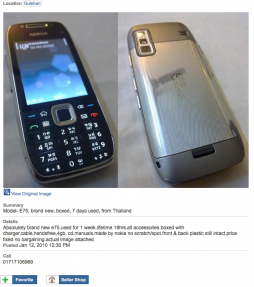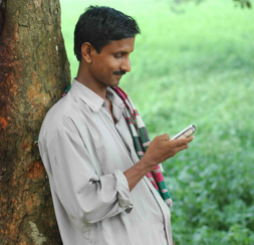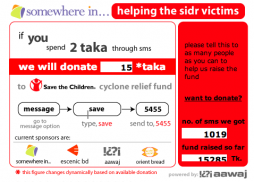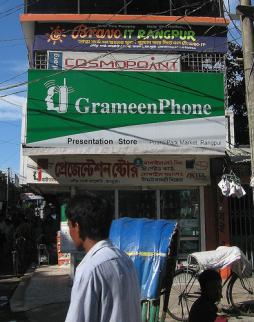bangladesh
Posted by AnneryanHeatwole on Sep 10, 2010
BBC Janala is part of a multi-platform effort to bring English language education to millions of Bangladeshi people. It is part of the BBC World Service Trust’s “English in Action” program, dedicated to teaching English to 25 million people in Bangladesh. Using mobile phones, BBC Janala offers audio English lessons and quizzes to callers – and in a short amount of time has seen rapid pickup across the country.
| Press One For English: BBC Janala Offers English Language Courses Over Mobiles data sheet 16060 Views |
| Countries: |
Bangladesh
|
Posted by PrabhasPokharel on Jan 12, 2010
CellBazaar, often called the "Mobile Craigslist of Bangladesh", has provided a martketplace to buy and sell goods and service to Bangladeshis for three and a half years now. We reported on the organization previously in April 2008. Since then, the service has grown and has now user base of just under 4 million. Cell Bazaar processes 1000 posts/day, and founder Kamal Qadir was chosen by the World Economic Forum as a Young Global Leader in 2009.
I caught up with Kamal recently and talked to him about two things that I had wondered about CellBazaar that had not been emphasized in the coverage they have received.
| CellBazaar, Bangladesh's Burgeoning Mobile Marketplace data sheet 19205 Views |
| Countries: |
Bangladesh
|
Posted by AnneryanHeatwole on Oct 23, 2009
CellBazaar, a Mobile-Based e-Marketplace: Success Factors and Potential for Expansion data sheet 1646 Views
Author:
Ayesha Zainudeen, Rohan Samarajiva, Nirmali Sivapragasam
Abstract:
In emerging economies, access to accurate market information can be limited by poor, underdeveloped or even absent infrastructure. Countries are poor, partly because markets do not work well and markets do not work well, partly because of information problems. Isolated and poorly informed, farmers, traders and businesses simply cannot participate in commercial exchanges, and even when they do, tend to have limited bargaining power. Telecommunication can serve to ease such limitations (Jensen, 2007).
Infrastructural bottlenecks can also constrain physical access to markets; even if a farmer has access to current market prices. If he cannot get his produce to the right market before it perishes, that market information is useless. In Bangladesh, problems such as flooding, frequent electricity outages as well as urban congestion (CKS Consulting, 2009) only serve to compound such problems. This is not just so for agricultural markets, but even the market for second hand goods, services, and much more.
Electronic commerce (e-commerce), or the conduct of commercial transactions over electronic networks (OECD, 2002) has been seen as a way of reducing friction in the marketplace; this allows larger volumes of transactions to take place, effectively expanding markets, but also opening up entirely new markets (Mann, Eckert and Knight, 2000; Steinfield and Klein, 1999), allowing marketers (large and small) to exploit the Long Tail (Anderson, 2006).
In developed economies, e-commerce has taken the form of commercial transactions being facilitated over the Internet, but recently has been extended to mobile networks as well, owing to their growing ubiquity. In emerging economies poor Internet penetration and the lack of secure payment mechanisms, inter alia, have slowed the growth of e-commerce. Meso, Musa and Mbarika (2005) note that there is little empirical evidence of success of mobile commerce in the developing world; most evidence is anecdotal. However, as this paper will show, e-commerce is in fact taking place over these networks, even if not in the same form as in developed economies.
Posted by LeighJaschke on Jul 14, 2009
id21 insights 69 l September 2007: Research findings for development policymakers and practitioners id21 insights data sheet 3019 Views
Publication Type:
Magazine or newspaper article
Abstract:
id21 insights is published 10 times a year and is online at www.id21.org/insights. Readers
may copy or quote from any article, providing the source (id21 insights) and author are
acknowledged
and informed. To subscribe, email insights@ids.ac.uk with your name and
address. id21’s website, www.id21.org, offers free access to over 4,000 research highlights
on development policy issues including health, natural resources, education and more. This issue focuses on micro-entrepreneurs in Nigeria, mobile ladies in Bangladesh, unequal gender relations in Zambia, getting beyond the three billion mark, mobile banking and poor households in Jamaica.
Posted by on Jan 01, 1970
n/a
Posted by CorinneRamey on Apr 28, 2008
Imagine you're in Bangladesh and you want to buy a cow. You pull your mobile phone out of your pocket and start sending text messages to 3838, the shortcode for CellBazaar, a mobile phone marketplace which some have called the "Craigslist of Bangladesh." You look through the relevant ads and look at the ages, locations, and number of teeth of the 187 cows that are currently for sale. After another SMS, you are connected with the phone number of the the seller, ready to make your new purchase. What could have taken days to coordinate was made easy by a series of simple text messages.
Kamal Quadir, the founder of CellBazaar, sat down with MobileActive for an interview. Quadir said that he first got the idea for CellBazaar when he was a graduate student at MIT. "I was surrounded by technologically sophisticated people," said Quadir, who is originally from Bangladesh.
Posted by KatrinVerclas on Nov 21, 2007
Bangla blogging platform Somewherein,together with Save the Children, has launched an SMS fundraising campaign thay call “Jagoron” (‘the awakening') to generate funds from within Bangladesh to support Sidr victims.
A mobile phone user texts the keyword 'SAVE' to the given number. Each SMS costs Bangladeshi Taka (BDT)2. Somewherein and other sponsors add a donation to each SMS generated -- currently 15BDT (this amount goes up as more corporate sponsors join the campaign) for every BDT2 generated with the total amount going to the Save the Children Cyclone Relief Fund.
The service is available to Bangladeshi residents only.
Posted by CorinneRamey on Oct 08, 2007
Abu Sufian's small room in Fultola, Bangladesh looks like a standard Internet cafe. There are four workstations -- each with a mouse, keyboard, and monitor -- where customers can check email or browse the Internet. But this isn't just any Internet cafe -- the center is all made possible by one mobile phone.
According to this article from Telecentre.org, this "Community Information Center" only has one computer, which acts as a server for the other workstations. Internet access is provided by the EDGE-enabled (Enhanced Data Rates for GSM Evolution) mobile phone. From the article:
Posted by on Jan 01, 1970
n/a




